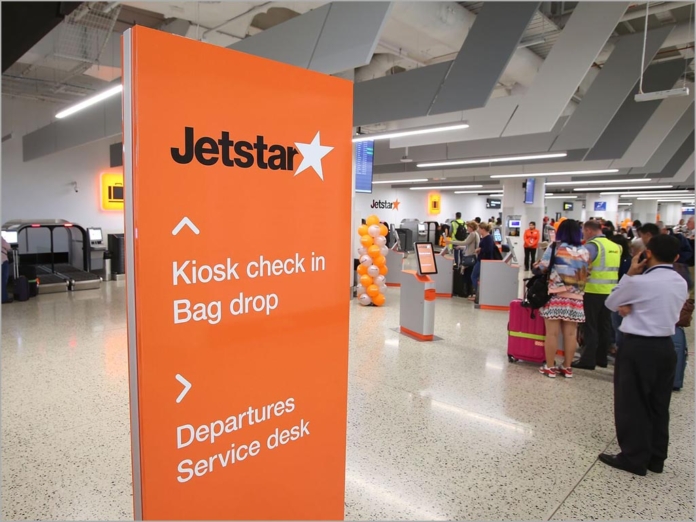
news National airline Jetstar this week announced it had appointed an executive with less than three years’ worth of experience in a technology role as its new chief information officer, in an unorthodox move for a major Australian corporation.
In a statement issued this morning, Jetstar announced the appointment of Claudine Ogilvie to the role of Group Chief Information Officer.
Starting mid-August, Ms Ogilvie will take on responsibility for the technology platforms that support Jetstar’s five branded airlines across the Asia Pacific, reporting to the Group CFO Race Strauss.
Race Strauss said Ogilvie had an exceptional track record and would bring a strong commercial focus to the role.
“We’ve made significant strides with our technology strategy during the past three years and Claudine inherits a great platform to build upon,” Strauss said. “Under Claudine’s leadership I know we’ll see continued improvement in the commercial and strategic alignment of the technology platforms that support our airlines.”
However, according to Ogilvie’s LinkedIn profile, the executive only has a small amount of experience as a top technology executive.
The executive’s only direct technology experience has been as chief information officer for Ridley Corporation, an agribusiness manufacturer. Ogilvie has held that role since August 2013. The executive does not appear to have any formal IT qualifications.
Previous to that role, Ogilvie held a position as associate director for consumer and industrial markets for consulting firm KPMG, for three years. Prior to that role, the executive was a marketing development manager at KPMG.
The executive has held other roles in product management, sales operations and promotions, and was a part of the Australian Olympic Sailing Development team, qualifying as part of the World Championships in Copenhagen in AUgust 2009.
The executive’s IT experience differs markedly from other executives who have held the CIO role at Jetstar. For example, Grainne Kearns, the outgoing CIO, had long been a senior executive at Telstra, including holding a role as chief information officer at its former Sensis division. Similarly with its founding CIO Stephen Tame.
Delimiter has invited Jetstar to comment this situation.
Delimiter believes part of the reason for the appointment was the fact that Jetstar was looking for expert commercial experience, rather than deep technical expertise, for its new CIO role, with much of its IT development work having already been completed in the past.
In addition, there is precedent for the broader Qantas group to appoint technology executives without much technology expertise; for example Jetstar Australia and NZ chief executive David Hall previously led a technology transformation program at Qantas without having an IT background.
Ogilvie said it was an exciting time to be joining the low fares airline.
“I’m very much looking forward to working with the talented team at Jetstar to drive innovation and optimise the technology platform for the benefit of customers and the organisation,” Ogilvie said.
“Jetstar is an amazing brand with a growing footprint across Asia Pacific, and I’m really excited to join a company that is working so hard to make the world more accessible for millions of customers.”
Kearns will help the business transition over the coming months before leaving for her next challenge.
opinion/analysis
I can’t personally say whether Ogilvie is qualified for this role — I don’t know her, and I don’t know precisely what her responsibilities have been in prior roles.
In seeking to analyse the situation, I would suspect that Jetstar’s IT operation has changed over the years. It was set up by its pioneering founding CIO Stephen Tame and attracted a lot of notice for its innovative approach. However, it’s possible that in 2016, Jetstar’s IT is pretty much nailed down and doesn’t require much active technical development work.
It’s also possible that Jetstar’s IT operation is largely dependent on the systems and processes of its big brother, Qantas.
For both of these reasons, Jetstar may no longer require a high-flying technical CIO with a national profile to lead its IT operations, as it has in the past. It may need someone who is more commercially and business-minded rather than someone with a deep technical background. It’s quite possible that Ogilvie may fit this need precisely.
However, I think it’s fair to say that there is at least a question here which needs to be asked, and it’s a question I like to ask every time I see a senior executive without a deep technical background appointed to a CIO role. Jetstar is a major Australian airline. Is just three years of direct IT experience enough for someone to become its chief information officer?
Image credit: Jetstar, Creative Commons


Who needs experience or expertise nowadays? That’s old-fashioned thinking Renai. You just need a lot of front and bullsh1t! We have a nuclear energy dropout running the NBN now. Get with the times.
Good CIO’s come from strong technical background, with an equally strong business and financial nous to budget and plan for the future in a way that makes IT the competitive advantage, revenue generator, and innovation powerhouse of any enterprise.
Sometimes CIO’s are hired by the senior executive team to drive down costs, not understanding where the future lies, or which IT investments are worth their weight in gold, versus other more spruiked and well marketed boondoggles. I hope it’s not this case, because that way lies irrelevancy, which we’ve seen at smaller financial institutions in Australia time and time again, when the Bank’s leadership team don’t realise they are an IT shop with a banking license, in a moribund market absolutely ripe for disruption.
I hope that a fresh perspective will lead to some excellent ideas at Jetstar. Sometimes, thinking outside the box can really help, but it has to be the right box.
Indeed, I was thinking much the same. A commercial focus is not always good for the underlying infrastructure that underpins it all. Front facing IT, is normally just the tip of the iceberg.
Jetstar are hobbled when it comes to IT by Qantas.
They are not allowed to deploy technology that would save time and money as it would make them competitive with Qantas.
For example automated bag drop systems that Qantas has could be used by Jetstar and reduce the staff required to check people into a flights. This system wont be used by Jetstar as it improves their service level to much meaning Qantas could lose customers to Jetstar.
It may be possible for them to do this in Melbourne now as the new Jetstar terminal is a 30 minute walk from Qantas and more importantly too far from the Qantas Lounges.
I don’t think Jetstar get to make many decision on the IT side of things and if they do Qantas has veto power if it risks profits.
Good points, but hard to believe Q is battling with its own company, it sounds like they have conflict of interest, well if that is true then Q is helping other airlines to drain its own margin from J by not sharing right technologies.
She is a CIO not CTO, why deep technical skills are required for the role? If others CIOs are technical that doesn’t mean JetStar CIO should be techi. Is like CEO of an airline must be a certified commercial pilot, sounds good but the person comes with strong experience of flying a plane not sufficient to fly a brand.
It explains why their systems were down in melbourne went down from a power outage. NO UPS. And I believe it’s a legacy faulty system too.
Happened a couple of years ago now. Took me 2 days to get home because of that.
Profit over safety.
Geeks don’t have the people skills to manage people. Managing geeks needs a strong, take-no-bullshit approach because they will try to get away with all sorts of crap that diverts and distracts from the tasks at hand. They need to know they are replaceable.
Putting a monkey in charge of the zoo is not the way to go. The CIO needs to be a boss, not a mate, so making the position non-tech is the best way to go.
That’s utter BS, and I’m sad for you that you’ve not met well adjusted technologist managers before. On the same basis, your argument would never appoint an accountant as CFO or an MBA as CEO, which is clearly ridiculous on the face of it.
Your comment is invalid.
So how is she going to oversee the development of complex data analysis strategies to gain better insight into customer/product behaviours & opportunities? How is she going to understand the numerous management challenges associated with delivering what a CIO might prescribe at a high level? How is she going to know when a suboptimal project proposition is pushed in her direction? What level of ICT supplier management experience does she have? Say whatever you like, but three years simply isn’t enough.
Wow, what an archaic approach to management. I feel sorry for anyone that has you as a boss.
CIO does not need to be technical Renai. Information Technology helps, but information is still information. That’s why you have a CTO alongside the CIO who can translate informational requirements into suitable technology.
CxO roles are not the same between organizations, so I think it’s a bit rich to pass judgement on their executive strategies!
Well, I work in a state government department where we have no CTO, and the CIO needs to ask for help to add a contact to his iPhone. I $h*t you not.
To those who think a CIO needs no technical knowledge: what skills DO they need that then might as well be done by the CFO?
Does that apply if there’s no CTO as well?
Sorry, but I blame the sad state of so many, if not most, IT departments in organisations to exactly this issue: CIOs who can’t turn on their own bloody smartphones making technical decisions – and mostly just reacting to Gardner and whatever BS the latest sales drone through the door just bamboozled them with!
Another high quality outcome here from CIO Advisory….. engineered giving GK the bullet, and then proceeded to downgrade the role and facilitated this outcome. What’s next?
Fellow recruiters have agreed there is a trend with this firm, look at the track and posts on this forum for Toll (disaster) -> Medibank (disaster) -> now Jetstar (tbc)
You have been warned…..
They are running a hodge podge of the cheapest nastiest systems that don’t talk to each other or any of the QF systems requiring a lot of duplication of data entry. So no technical skills will be an issue. Keeping everything online however is a challenge.
So what on earth are they thinking?!?
You don’t need technical experience to be a Good CIO especially in a company the size of Jet Star. They should look to employ a CTO for this. My concern would be lack of relevant Industry experience and just two years in the CIO role. I would bet money she will be done within 2 years.
1. IT is never ever bolted down , particularly in airline where innovation is often the differentiator.
2. Not being heavily technical and being the CIO isn’t a problem, but what is more of a problem is the industry knowledge. However the new Jetstar CIO will need to have a great team around her given her lack of tech depth – which will cost, so not sure how the commercial nature of the selection then stands up here ??
3. Airline is massively tech dependant, and Jetstar not at all reliant on QF. You need to know where the cost inflection points are in tech in aviation and then drive these hard to reduce cost.
4. Seriously, if you’re a CIO or C suite anything today and not commercial you’re not a CIO- get a new career dinosaur.
Comments are closed.